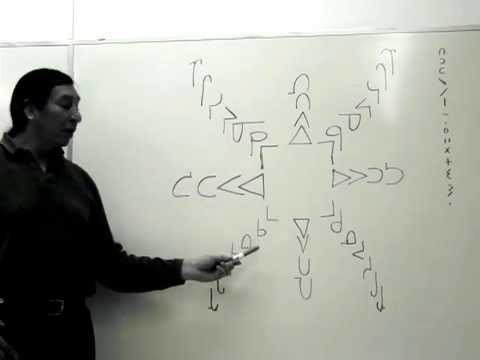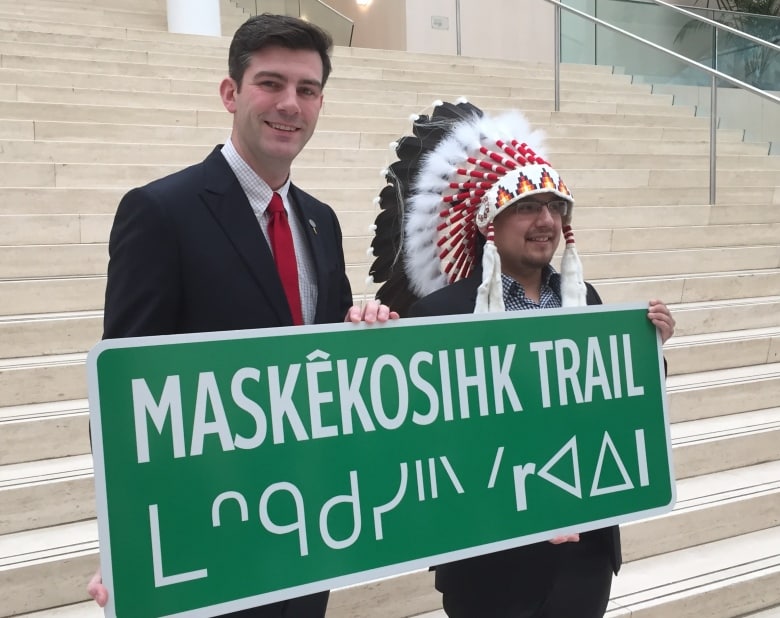Why I made yet another Cree syllabics converter

Image source: Ruben Quinn demonstrating the Cree syllabics star chart
Lately, I’ve been working on language technology for Plains Cree. Plains Cree is primarily written in two systems: standard Roman orthography (SRO) and syllabics. Since SRO uses the Latin alphabet—just like English—it is rather straightforward to type on a standard Canadian English keyboard. Syllabics keyboards are an ongoing struggle, however (I may expand on this some other time on this blog). Therefore, if one wants to write Cree in syllabics, it is sometimes easier to type it in SRO first, then use a transliterator to convert from SRO to syllabics.
In summary, I created a new bidirectional transliterator called
cree-sro-syllabics
(Edit: Try it online at syllabics.app!).
It’s a new transliterator, because several
transliterators already exist. So what do the others look like?
What are the freely available transliterators?
A quick Google search will net you at least the following SRO to syllabics transliterators.
- The Maskwacîs Plains Cree Syllabic Converter1
- The Algonquian Linguistic Atlas Cree Syllabics Converter
- Syllabics.net’s Plains Cree Syllabics Converter
However, none of these transliterators are perfect.
The issues
Word final “hk”
In syllabics, a word that ends with an “hk”—or “ᐦᐠ” in syllabics—are supposed end with “ᕽ” instead. However, this replacement can never occur in the middle of a word.
For example, the word “ê-wêpâpîhkêwêpinamâhk” (“we (and not you) are setting it swinging”), contains both a final “hk” and a “hk” cluster in the middle of the word. Its syllabic transcription is ᐁᐍᐹᐲᐦᑫᐍᐱᐊᒫᕽ.
Although the Algonquian Linguistic Atlas’s converter and syllabics.net’s converter both handle this, the Maskwacîs Converter does not, instead producing ᐁ ᐁᐧᐸᐱᐦᑫᐁᐧᐱᓇᒪᐦᐠ, with an erroneous “ᐦᐠ” cluster at the end.
Transliterating non-Cree words
Some transliterators attempt to convert every Latin character, even if it doesn’t make sense. Take the case of “Maskêkosihk Trail”—a road that goes from Edmonton to Enoch Cree Nation. The City of Edmonton unveiled the street sign, and, in the process, they unveiled an embarrassment:
Image source: CBC
Not only does the syllabics transliteration of the sign contain the “hk” error as mentioned above, but it half-transliterates the English word “trail” into syllabics. The result is that “trail” is rendered as “ᐟrᐊᐃl”, which contains Latin characters in the transliteration!
In my opinion, an SRO to syllabics transliterator should refuse to transliterate words that do not have the structure of a Cree word. However, all three of the mentioned transliterators do attempt to transliterate “trail” with differing results:2
| Maskwacîs Cree Dictionary | ᐟrᐊᐃl |
| Algonquian Linguistic Atlas | ᐟᕒᐊᐃᐪ |
| Syllabics.net | ᐟᕒᐊᐃᓬ |
Long vowels
Long vowels (âêîô) are distinct from short vowels (aio) in Cree. Long vowels are written with a dot above in syllabics. The exception is for “ê” because it is always long; as a result, some writers also drop the diacritic when writing “e” in SRO as well. It’s important to differentiate between long and short vowels, because it makes distinctions between words. For example, nipiy/ᓂᐱᕀ means “water” while nîpiy/ᓃᐱᕀ means “leaf”. However, there is such a thing as “plain” script, where the vowel dots are omitted, and pointed script where the vowels have all dots.
Another complication is that the “standard” Roman orthography in practice has multiple conventions for writing long vowels: using a macron (◌̄) and using a circumflex (◌̂).3
How do the various converters handle long vowel diacritics? The Maskwacîs converter does not produce dots for long vowels at all, however it accepts both macrons and circumflexes as input. The Algonquian Lingustic Atlas’s converter not only produces dots, but supports input in either macrons or circumflexes. The syllabics.net converter does worst of all, handling only macrons for long vowels. It simply spits out characters written with circumflexes. Additionally, it does not handle “ê” without an diacritics, which all other converters do.
Other odds and ends
Other issues for syllabics converters include how they deal with dashes, how they deal with combining diacritics, rather than pre-composed characters, and whether they produce the correct Unicode characters for the syllabics rather than very convincing look-alikes. There’s also the sandhi orthographic rule, but honestly, I’m not sure I fully comprehend how to apply this rule myself.
Summary
Here’s a breakdown of the previous issues, and whether each transliterator can handle it correctly.
| Word-final “hk” | Non-Cree words | Long vowels | |
|---|---|---|---|
| Maskwacîs Cree Dictionary | ❌ | ❌ | ❌ |
| Algonquian Linguistic Atlas | ✅ | ❌ | ✅ |
| Syllabics.net | ✅ | ❌ | ❌ |
Where’s the source code?
The most pressing issue to me personally is that I cannot find source code for any of these converters! This means that if other people want to incorporate a converter into their own app without an active internet connection, they can’t. They have to either reverse-engineer the converters online, or write their own code to do the conversion.
cree-sro-syllabics: an open-source Python and JavaScript library for syllabics conversion
My solution was to create a Python library that is free and open source.
EDIT: (2018-12-06) Now also available for JavaScript!
It handles all the issues previously mentioned. Try it with the following test cases:
The source code for cree-sro-syllabics can be found on its GitHub
page, but it can also be seamlessly incorporated into a Python
project that uses pip by installing it with:
pip install cree-sro-syllabics
EDIT: (2018-12-06) You can use npm to install
cree-sro-syllabics in your JavaScript project:
npm install cree-sro-syllabics --save
Or you can copy-paste the .js file to your project (as long as you
keep the AGPL license comment at the top!)
The future
I hope in future versions to add support for Woods Cree and other West Cree dialects. There are also a few interesting things that can be done to make sure SRO and syllabics conversions can be completely reversed without losing information about morpheme boundaries.
EDIT: (2018-12-06) In the original post, the library was called
crk_orthography. It has been renamed to cree-sro-syllabics.
EDIT 2: (2018-12-06) cree-sro-syllabics now features beta
support for Woods Cree (Th-dialect) and Swampy Cree (N-dialect).
-
I don’t have an iPhone to confirm this, but I believe this is the same converter bundled in the Cree Dictionary app. ↩
-
I wonder if the sign designer used the Maskwacîs transliterator to get this result. ↩
-
Anecdotally, I find that most writers near Edmonton and Maskwacîs prefer circumflexes to macrons; however noted Algonquian linguist Arok Wolvengrey prefers macrons. Heck, Jean Okimāsis writes her surname with a macron! ↩
